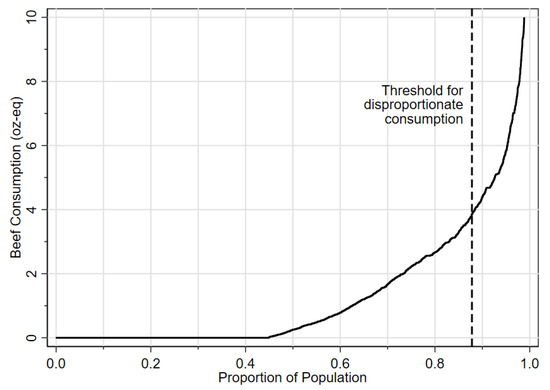166
Demographic and Socioeconomic Correlates of Disproportionate Beef Consumption among US Adults in an Age of Global Warming
www.mdpi.comConcern for the environment when making dietary choices has grown as the contribution of the food sector to global greenhouse gas emissions becomes more widely known. Understanding the correlates of beef eating could assist in the targeting of campaigns to reduce the consumption of high-impact foods. The objective of this study was to identify the demographic, socioeconomic, and behavioral correlates of disproportionate beef consumption in the United States. We analyzed 24-h dietary recall data from adults (n = 10,248) in the 2015–2018 National Health and Nutrition Examination Survey (NHANES). Disproportionate beef consumption was defined as an intake greater than four ounce-equivalents per 2200 kcal. Associations of this indicator variable with gender, age, race/ethnicity, education, family income, diet knowledge, and away-from-home meals were assessed using logistic regression, incorporating survey design and weighting. Disproportionate beef diets were consumed by 12% of individuals, but accounted for half of all beef consumed. Males were more likely than females (p < 0.001) to consume these diets. This relationship was seen in all bivariate and multivariable models. Older adults, college graduates, and those who looked up the MyPlate educational campaign online were less likely (p < 0.01) to consume a disproportionate beef diet. While almost one-third of reported consumption came from cuts of beef (e.g., steak or brisket), six of the top ten beef sources were mixed dishes: burgers, meat mixed dishes, burritos and tacos, frankfurters, soups, and pasta. Efforts to address climate change through diet modification could benefit from targeting campaigns to the highest consumers of beef, as their consumption accounts for half of all beef consumed.



Most surprising here, imo, is that only 12% of the population eats more than 4oz. of beef per day. That honestly feels low to me.
You might be one of the 12%.
Running the math on my own habits, I don’t think so, but I just figured some people are enough burgers alone to push the numbers higher than that
Dude that’s so SO much beef WTF you mean that you’re surprised?
I wouldn’t have been surprised to hear that 10% of the population ate a 4oz burger for lunch every single day. Not saying it’s good or not a lot, but just thought more people did it
deleted by creator
@idkwhatimdoing @pizzaiolo European here. I doubt if I average more than 4oz of beef per fortnight. And yes, I have the occasional steak.
I think it’s because people also have preferences for other types of meat. E.g. I always prefer chicken, but it’s uncommon here so usually I go with the cheapest option: pork. I’m appalled at how high I’ve let my meat consumption slip, but this paper would still classify me as not excessive beef consumption.